
4 signs you’ve eaten too much salt
Feeling the urge to glug a glass of water shortly after you’ve munched a packet of crisps, bowl of popcorn or handful of peanuts, is a clear sign your snack was on salty side – and that’s not necessarily a bad thing. “Salt is a necessary requirement to eat – and not for flavour,” says Pippa Hill, nutritionist and founder of The Weight Loss Guru. Table salt, aka sodium chloride, contains around 40% sodium, an essential nutrient. “Eaten in a small quantity, sodium helps the conduction of nerve impulses, muscle contraction and relaxation, and helps maintain the balance of water and minerals,” she continues. “A lack of salt can lead to muscle cramps, nausea, fatigue and light-headedness.” However, consuming more than the 6g a day recommended by the NHS for adults – equating to around one teaspoon – can be detrimental for your health. “A high salt intake disrupts the natural sodium balance in the body,” says Olivia Burley, registered associate nutritionist who is currently working on the NHS Diabetes Prevention Programme. This can result in high blood pressure, she explains: “Hypertension is a condition where blood pressure remains elevated over time, which can increase the risk of heart and circulatory diseases.” Unless you keep a very close eye on food labels, it’s not always obvious how much salt you’re eating in a day. “Examples of foods high in salt can be canned fish or poultry, frozen foods such as breaded meats, salted nuts, canned beans, cured meats, soup and sandwiches,” says Hill. And just because you’ve drunk enough water to quench your thirst doesn’t mean you’re negating the effects of too much salt, which is why it’s important to be aware of other health indicators. “If you are experiencing any or all these symptoms, it is always best to seek medical advice,” Burley advises. 1. Headaches The dehydration caused by excess salt intake can lead to severe headaches. “These headaches tend to be more painful than a mild one, giving a throbbing sensation as the blood vessels are being expanded,” Hill says. “They tend to come on between an hour or two after you’ve eaten, as sodium levels rise through the body.” They may come on quicker if you have high blood pressure or suffer from chronic headaches in general, but can often be solved by rehydrating. “As your water levels are imbalanced, by drinking more water you’re able to minimise and get rid of the headache.” 2. Swollen feet and hands Also known as edema, swelling of the fingers, ankles or feet can be a delayed reaction to a spike of sodium. “When too much salt is consumed, the body retains the extra sodium and increases the fluid outside of the cells, Burley explains. “This causes the kidneys to have reduced function, remove less water and therefore increase blood pressure.” Swelling may occur more when sitting down for too long or on long journeys. “This isn’t an instant response after eating, but if in the next 24 hours of having eaten salty foods you notice swelling in these areas, it could be a link,” Hill says. “It’s best to seek medical advice if this is an ongoing occurrence, as it could be a sign of a more serious health concern.” 3. High blood pressure “Salt is the largest cause of high blood pressure,” Hill warns. “Within just 30 minutes, eating excess salt will have a bodily reaction to the blood vessels.” Also called hypertension, if left untreated it can increase your risk of serious problems such as heart attacks and strokes. Hills says: “If after eating a salty diet, your symptoms include blurred vision, chest pain such as a tight feeling, palpitations, shortness of breath or sudden nosebleeds, it could mean you have a raised blood pressure.” Burley adds: “Hypertension can often have no symptoms and the only way to know your blood pressure is to get it monitored using a machine.” 4. Frequent urination “Excessive thirst is a common response to eating salty foods and naturally leads to an increase in fluid consumption, causing excessive urination,” Burley says. By sending the signal that you need to guzzle lots of liquid, the body aims to remove the excess salt build-up. “Although drinking more fluids in response to an increase in salt is one of the main reasons for urine production, it could be a symptom of other conditions like polyuria, therefore medical checks are best.” Read More Charity boss speaks out over ‘traumatic’ encounter with royal aide Ukraine war’s heaviest fight rages in east - follow live Am I just tired or is it ME? Dr Alex George: Five months of sobriety has made a ‘huge difference’ Everything you need to know about Sophie, the new Duchess of Edinburgh
1970-01-01 08:00
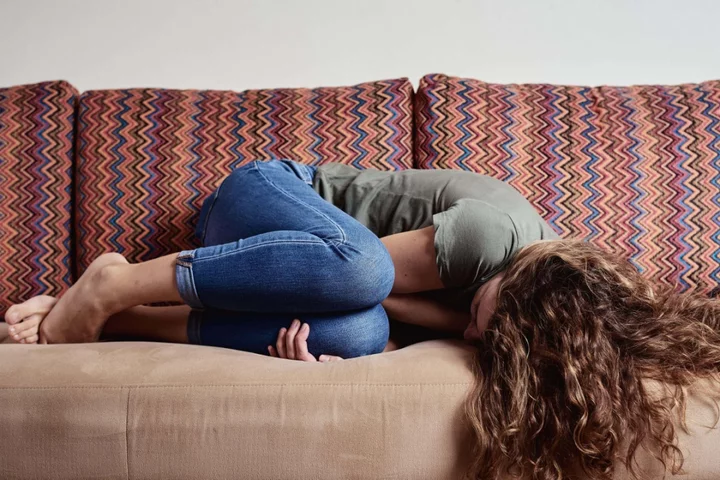
Am I just tired or is it ME?
ME, or myalgic encephalomyelitis, is a serious, long-term chronic illness that impacts the sufferer, leaving them often suffering from extreme exhaustion. ME has for a long time been under-researched, but as awareness of the condition grows, more people are coming forward for help. As a grouping of symptoms, instead of a clearly identifiable illness, ME is very hard to diagnose and thus people can suffer for years before getting help for it. Symptoms can include exhaustion, digestive issues, muscle weakness, shortness of breath and irregular heart rate. But how do you know if you are suffering with ME, or are just really exhausted? Overlapping symptoms Covid has made ME more prevalent, but people still find it so difficult to know what may just be tiredness. “It is really difficult to tell the difference. ME and CFS (chronic fatigue syndrome) have a lot of overlap [with tiredness] and there have been a lot of issues with long covid with these long persisting post-viral malaise, where even if people sleep well, they may still feel exhausted,” says GP and men’s health specialist Dr Anand Patel. If you have had covid or another viral illness, this may increase the likelihood of having ME. Get checked out “If you have had persisting symptoms for more than a few weeks or they are really severe, speak to your GP,” says Patel. Particularly if “you are sleeping okay, your diet, caffeine and alcohol intake are okay, but your symptoms are persisting. They may check your thyroid and blood count”, he explains. “A quarter of our appointments these days are classed as ‘tired all the time’. It is very difficult to weed out what is what when ME and CFS are groups of symptoms that are bundled together. It is not necessarily something that will cause medical harm, but will cause really significant symptoms to sufferers,” says Patel. “With ME, you may be so tired you can barely stay awake in the day. We are still in the exploratory stage of what does cause it, but if you have had psychological trauma or illness it is more likely to be ME that has caused these prolonged symptoms. It can be hard to find things during tests and scans, but of course, there are conditions we don’t have tests for or are hard to identify,” he explains. Be clear of your symptoms “It is really difficult to diagnose something if you can’t find it, so a patient needs to explain symptoms and how they are feeling. Many people with it don’t feel seen, and a doctor may be struggling to find a specific answer,” Patel explains. Keeping a diary of symptoms may help to make it clear. Vitamin deficiencies Consider what the other causes may be. “Tiredness could be caused by blood count and anaemia, thyroid function and deficiencies, dietary changes and vitamin deficiencies,” says Patel. “If you have a varied diet, these are unlikely. B12 and folic acid deficiency are common, they make blood make new cells and are important in nerve function. Also, it could be vitamin D deficiency, a lot of people need to take a vitamin D tablet every day in the UK because we don’t get enough sun and slap on factor 50 as soon as it does come out,” Patel says. Read More Charity boss speaks out over ‘traumatic’ encounter with royal aide Ukraine war’s heaviest fight rages in east - follow live Dr Alex George: Five months of sobriety has made a ‘huge difference’ Everything you need to know about Sophie, the new Duchess of Edinburgh Beyonce kicks of Renaissance tour in string of glamorous outfits
1970-01-01 08:00

Peloton recalls two million bikes after adjustable seats cause injury hazard
Peloton has recalled more than two million bikes due to safety concerns caused by the adjustable seat breaking during use. The US Consumer Product Safety Commission issued a recall for about 2.2 million bikes after receiving 35 reports of the bike’s adjustable seat post “breaking and detaching” during rides, including 13 reports of injuries such as fractured wrists, lacerations, and bruises from falling. The recall affects bike model PL01, which was sold from January 2018 to May 2023 for about $1,400 and manufactured in Taiwan. “Consumers should immediately stop using the recalled exercise bikes and contact Peloton for a free repair,” the CPSC said in a statement, adding that Peloton is offering customers a free seat post that can be self-installed. Peloton said bike models can be identified by the label on the inside front fork of the bike, near the flywheel. This is not the first time Peloton has faced a widespread recall. In May 2021, the exercise company was forced to recall 125,000 of its treadmills following the death of a six-year-old child and dozens of other injuries. The CPSC said Peloton began receiving reports of incidents and injuries with the treadmills as early as December 2018, but failed to promptly report the treadmill hazards. The New York-based company agreed to pay a $19 million fine. The Independent has contacted Peloton for comment. Read More Parents sue Peloton after three-year-old child is left with third-degree burns from treadmill Peloton issues warning to keep kids and pets away from treadmill after child killed Peloton recall faulty pedals from 27,000 bikes following injuries
1970-01-01 08:00

Dr Alex George: Five months of sobriety has made a ‘huge difference’
Dr Alex George has revealed that more than 150 days without alcohol has been “a challenge” but has made a “huge difference” to his life. The former Love Island star, TV doctor and now the UK government’s youth mental health ambassador shared that drinking at weekends would sometimes affect him for up to four days afterwards. The 32-year-old quit his A&E doctor job 18 months ago to focus on bringing the public accessible health advice, often on TV – including Channel 4’s Naked Education – and five months ago, he cut out booze too. “It’s made a really huge difference,” George says. “I get to bed at 9pm every night, I wake up at 6am, I listen to music, I play music, I go to the gym, I spend quality time with a small number of people – I’ve developed really, really strong boundaries about how I spend my time and who I spend it with.” It’s an “investment” in himself, he says, but it isn’t always easy. “When you’ve got a bank holiday weekend and a lot people are sat in a beer garden – that is a challenge. Because even if you’re not addicted to alcohol, and you’re just a part of the British culture, you’ll feel challenges of not drinking in those times. “But it’s looking at what will future Alex be grateful for – you know, that delayed gratification.” It’s a topic he explores in his latest book, The Mind Manual, on the mental fitness foundations to give us all a boost – just in time for Mental Health Awareness Week (May 15-21) – including how to hold better boundaries and why mistakes are part of life. “I didn’t like how alcohol made me feel,” George, who also hosts the walking and wellness podcast Stompcast, says. “I was drinking pretty standard-ish for a young person in their 30s, but after four, five or six beers on a Saturday night, I’d feel bad – that would affect me a small percentage [of the time] all the way up to Tuesday or Wednesday.” “It affected my desire for the gym, it affected the way I ate, it affected the relationship I had with myself – so I had a really honest conversation with myself.” His book is about asking people to challenge things: “Question why are you doing this behaviour?” During some self-reflection when he was still working in A&E, George says he realised he wasn’t practising what he preached. “I thought, ‘I’m here talking about finding balance and looking after your own mental health, and I’m actually damaging my own mental health by doing too much.” Self-worth is often so tied up with the roles we have in our careers, so it was a difficult decision to leave, he says. “Since the age of 12 or 13, I’d wanted to be a doctor. You sacrifice a lot, university is tough, I worked in King’s College Hospital then Lewisham Hospital [London]. It was my passion, I covered a lot of the pandemic – on social media, it was my identity. “But I think sometimes, it’s really, really important to remember that just because your identity is a part of your life, it doesn’t have to be your identity your whole life. Walking away or changing direction [doesn’t mean] that time of your life is now devalued. “Even though I am not ‘Alex the A&E doctor’ anymore, it is all ingrained in who I am.” He’s had a significant impact as a public health doctor though, securing £79million of funding towards mental health support teams in schools in 2021. He’s thankful for the platform Love Island fame afforded. “Of course, if it wasn’t for that show, I wouldn’t have got that [money] for the kids.” He also started the #postyourpill campaign on social media – trying to banish the stigma around taking medication for mental health issues, like the anti-depressants he was prescribed last year. He’s also tirelessly campaigned for suicide prevention awareness and better early intervention for people with mental health issues, after his 19-year-old brother Llyr died by suicide in 2020. Heartbreakingly, George had been due to go home to Carmarthen, Wales, to see his family for the first time since the pandemic. “The week before my brother passed away, my best friend’s dad was terminally unwell and I stayed in London. In that time that I stayed, my brother passed away, so I could have seen him. “You question whether that’s a mistake or not. It’s very complex, because you don’t see the bigger picture always. [If] you know that a decision would have a certain outcome and it was a negative outcome, you wouldn’t make that decision a lot of the time. “I think that’s probably one of the biggest ones that I’ll have to live with.” Now though, George says he’s received “thousands – if not tens of thousands – of messages” and comments in person from strangers struggling in a similar way to Llyr, but saying they’ve now got help. “How many lives have been saved off the back of Llyr’s death? There’s an element of, ‘What can we control?’ I can’t turn back time, all I can do is try and support other people with their mental health.” The book discusses the ‘mental health toolkit’ George developed while he was grieving and growing – “Not just as a tribute to Llyr but as a tribute to the mental anguish I have faced in life, both before and since his death”. It includes written exercises to help readers audit their feelings as well as ‘universal truths’ to cling to in dark times, like “sleep is a saviour” and “connection is your superpower”. He adds: “Grief is with us for life. It’s never OK that person has died.” But we can find ways to “organise” that grief in our minds. Plus, difficult times are key for personal growth. “Sometimes, you have to walk through hell,” he says, “It sounds really dark, but in some ways, through difficult experiences, you learn a lot by yourself. You will know your resilience and your ability to cope with things. You also learn what helps you cope.” For George, that means walking (“a lifeline for me”), a few close friends and hiit classes at the gym. “In the last few years, there have been some significant highs and lows, but I do think what I’m grateful for is that in adversity, you learn a huge amount. I endured.” The Mind Manual by Dr Alex George is published by Aster, £20. Available now in paperback, and also as an ebook and audiobook. The Samaritans helpline is available 24/7 on 116 123. Read More Charity boss speaks out over ‘traumatic’ encounter with royal aide Ukraine war’s heaviest fight rages in east - follow live Everything you need to know about Sophie, the new Duchess of Edinburgh Beyonce kicks of Renaissance tour in string of glamorous outfits Pensioner, 85, shares the simple switch that’s helped him to do 650,000 press-ups
1970-01-01 08:00

Ricky Gervais says he’s ‘lived through the worst eight hours of illness’
Ricky Gervais has given fans a health update after “living through the worst eight hours of illness” of his life. On Thursday (11 May), the After Life star, 61, tweeted he isn’t “well today” and shared that he was suffering from symptoms such as severe abdominal pains, vomiting, hot sweats, and chills. “Oh, and I really want to know who planted the 12 gravy bombs up my a***,” Gervais quipped. Some Twitter users suggested he might be suffering from norovirus – or the “winter vomitting bug” – in the comments section. “Sounds like it is Noravirus [sic] that is going around. My friend and my daughter and son-in-law have had it. It is awful. Hope you get better soon,” one person said. Gervais replied: “Yeah, that’s what I thought.” Another person wrote: “Eight hours seems like a magic number when I get norovirus. I’m good for a full shift every time.” Other fans joked about the abundance of detail in Gervais’s descriptive post, with one person calling it the “perfect sick note”. “Just copy and paste that description, and voilà – you’ve got yourself a guaranteed day off. Even your boss will be too terrified to question it,” the comment read. In March this year, the number of norovirus cases in England rose to their highest levels in nearly a decade. The count fell from its peak shortly after but remained above levels reported in March 2022. Norovirus is one of the most common kinds of stomach bugs in Britain, and reportedly affects between 600,000 and a million people in the UK every year. The six most common symptoms include sudden onset of nausea, projectile vomiting, diarrhoea, high temperature, abdominal pain, and aching limbs. It spreads from contact with an infected person or contaminated surfaces. Most people who contract the virus will recover within two to three days. Norovirus, however, can cause dehydration, especially among the very young, elderly, and those with weakened immune systems. Read More Chrishell Stause and G Flip announce marriage after one year together Duchess of Edinburgh ‘praying’ for elderly woman hit by her royal motorcade Sir Karl Jenkins responds to claims that he was Meghan Markle in disguise at coronation: ‘I was surprised’ What is sepsis? Five symptoms you need to know A man thought he felt spaced out from drinking coffee. Then came a ‘huge shock’ Pensioner, 85, shares the simple switch that’s helped him to do 650,000 press-ups
1970-01-01 08:00
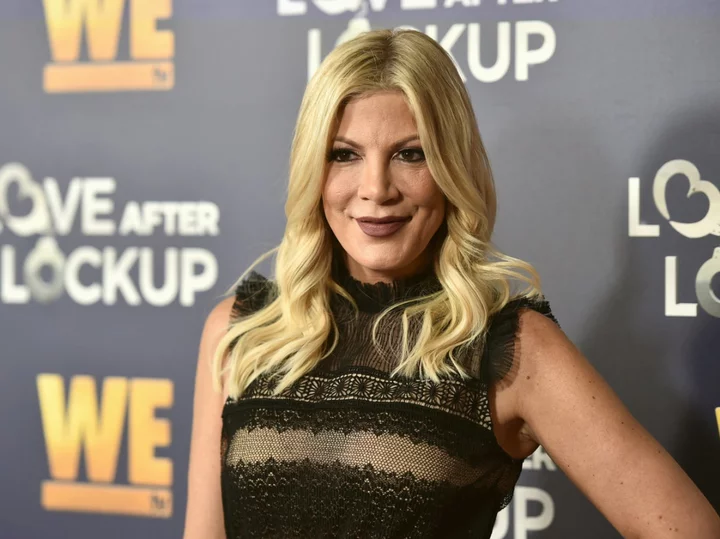
Tori Spelling says ‘extreme’ mould kept her children in ‘spiral of sickness’
Tori Spelling has documented how “extreme” mould impacted her family’s health, revealing they have been caught in a “spiral of sickness” for months. On Wednesday (10 May), Spelling, 49, gave her fans a health update on Instagram after discovering mould in their rental home. She shared pictures of her youngest children, Finn, 10, and Beau, 6, at an urgent care centre, explaining that they’ve been “so sick they are sleeping all day and say they feel dizzy even [while] standing”. Spelling captioned her post: “We’ve all been on this continual spiral of sickness for months. Sick. Get better. To get sick again. Used to think… well that’s what happens when you have young kids in school. They just continually bring sicknesses home. “But, when it gets to the point where they are at home sick more than being in school we had to reassess what was going on,” she wrote. After an inspection, Spelling discovered the “extreme” mould infestation which was making her family sick. “You just keep getting sick, one infection after another. Respiratory infections. Extreme allergy like symptoms too and, like my poor Finn, skin rashes as well,” the Beverly Hills 90210 alum said, outlining the various health conditions that had been triggered by the infestation. She said Finn was also suffering from Strep throat and had a high fever. Calling the house a “health hazard”, Spelling said she would be moving her family into an AirBnB or a vacation rental “till we can even grasp what to do”. The mother-of-five also criticised her children’s school for not believing “our kids were as sick as they’ve been continually”. Fans thanked Spelling for “bringing light to this public health emergency in our country” and shared recommendations for doctors who can help with mould-related infections. A recent survey found that more than a fifth of UK homes are suffering from damp. Read More Rihanna’s baby son’s Wu-Tang Clan-inspired name is finally revealed Viral coronation song: No, the choir did not sing ‘I love vagina, Camilla’ Chrishell Stause and G Flip announce marriage after one year together ‘Queen of the mommy bloggers’ Heather Armstrong dies aged 47 Man diagnosed with brain tumour after putting symptoms down to drinking coffee One in five people may be suffering from ‘dangerous’ sleep disorder
1970-01-01 08:00
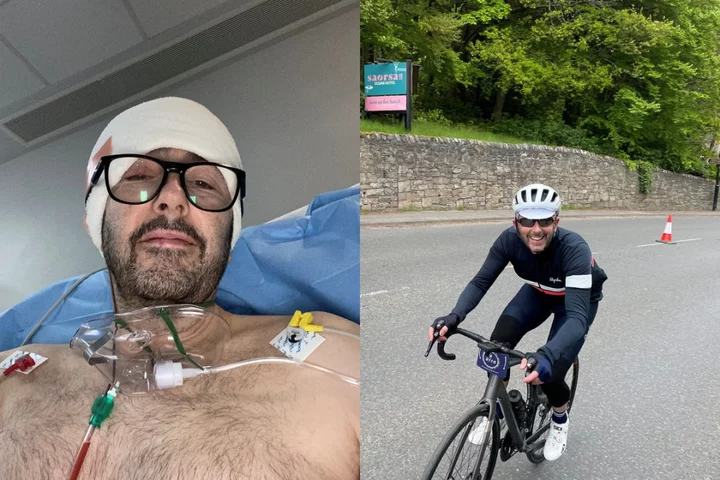
Man diagnosed with brain tumour after putting symptoms down to drinking coffee
A man diagnosed with a brain tumour after seizures he blamed on “drinking too much coffee” has made a full recovery – and is cycling 85 miles in May and 141 miles in June to celebrate the end of his chemotherapy treatment. Steve Biggin, 51, a sales assistant at Morrisons who lives in Sheffield with his wife, Anna, 47, and has three children, Lauren, 28, Mya, 24, and Evan, 21, began having “out of body experiences” at work in September 2021. He said they felt like “looking through someone else’s eyes” but later found out he had been having seizures. After two months of regular seizures, Steve had a severe thunderclap headache and after going to A&E was dealt the “huge shock” of a brain tumour diagnosis. He cycled every single day after he got the diagnosis, which he thinks made him “even stronger” and helped him make a good recovery after having the tumour removed successfully. He is now planning to cycle through the Scottish highlands on May 14 and from Morecambe to Scarborough in June to “prove” he can do it. “Cycling has helped me through the hardest of times and I think it helped me recover from the operation, emotionally and physically, and I want to prove to myself that after all this, I can complete the race,” Steve said. “I think when I cross the finish line, I’ll just have a big smile on my face. I’ll honestly be quite proud of myself.” Steve said the seizures did not leave him “fitting on the floor or anything like that” – though he did feel disconnected from the world. He said: “I couldn’t explain how I felt. They were almost like out of body experiences looking through someone else’s eyes. “I could still communicate and co-ordinate, it just felt so weird. It would happen at work when I was at the checkouts. “I just put it down as drinking too much coffee so I didn’t really think much of it.” Steve continued having seizures up to once a week until, in November 2021, he had a severe and sudden thunderclap headache at home that, little did he know, was another warning sign of cancer. He said: “The headache lasted for about seven minutes. I was being a typical bloke and played it down a bit. “I was sat in the living room with my family and told them and Maya, my daughter, said I needed to go to A&E.” To put his family’s mind at rest, Steve went to hospital, where doctors insisted he should have MRI and CT scans and kept him in the hospital for monitoring. After being in Sheffield’s Northern General Hospital for three days, on November 17 everything seemed normal; his wife went to visit him and they were both under the impression there was nothing serious going on. But then, as soon as Anna left, a doctor went to Steve’s bedside with devastating news. “The doctor came over and threw the curtains around. He said he had some bad news for me and I have a tumour,” he said. It was a huge shock to the system but I’m a very optimistic person Steve Biggin “I asked if it was cancerous and the doctor said it was. “It was a huge shock to the system but I’m a very optimistic person; I don’t know if I took it on board fully. “I remember there was a gentleman opposite me in the ward and he asked if he could pray for me, which I thought was beautiful, but I was definitely in shock.” Steve decided to tell his family his diagnosis the same evening but waited for Anna to get home because he did not want to tell her the news while she was driving, in fear she might crash. He said: “I rang Anna and she was having a glass of wine with the kids. They were all laughing and joking in the background so I decided to tell them the following day. “I didn’t have the heart to tell them when they were so happy. “It was a very lonely, sad night for me. “I told them over the phone and they came to see me the next day. They had tears in their eyes. “I was feeling positive when I saw them, though. “I was determined to beat it.” Steve was discharged from the hospital on November 19 and told Tesco he wanted to continue because he wanted to keep life as normal as possible. A few weeks later, he had a meeting with a consultant, who revealed his tumour was at stage two. Steve felt he was coping well and continued to be optimistic until he had a week off work to celebrate his wife’s birthday. He said: “We woke up on Anna’s birthday and we just both cried, not knowing how serious it was and what I was gonna lose. “I think that was the worst part. “But then, after that day, we got into the roll of things and got a date for the operation.” After Steve had a date for the surgery, he wanted to get as fit as possible and cycled every day, which he said “got (him) through his mental struggles”. On January 17 2022, Steve successfully had the tumour surgically removed. Steve said: “It was mixed emotions, I suppose. I was worried it was going to come back but I was overjoyed because they got rid of 99.9% of the tumour.” I’m strong-willed anyway but cycling made me even stronger Steve Biggin Throughout Steve’s recovery, he continued to cycle and stay as positive as possible. He said: “I think my fitness played a massive part in the recovery and, seven weeks after the operation, I did 35 miles on the bike on the road with my friend. “I’m strong-willed anyway but cycling made me even stronger.” One week later, Steve began having radiotherapy for six weeks, five times a week, followed by chemotherapy, in tablet form, for five days in a row, with 23 days off, for 12 months. He said: “I just got into a routine with it and I was just thankful to be getting over it.” Steve’s chemotherapy ended at the end of March 2023. He said: “I was just massively relieved and so was my family. “My tumour took a bigger toll on them than it did me and Anna, my wife, was my absolute rock.” To celebrate the end of chemotherapy, Steve is taking part in Etape Caledonia on May 14 and hopes to complete it in just five-and-a-half hours. “I’m so excited for it. It’ll be great to celebrate the end of treatment with something I truly love doing – and cycling really got me through the tough times,” he said. Steve is also planning on cycling 141 miles coast to coast, from Morecambe to Scarborough, over three days at the end of June. Looking back on the last few years, Steve said he thinks the experience has changed his perspective on life, saying: “I carry a little bit on my shoulder thinking it could come back. “But, hey, I’m 51, have a fantastic family… I’ve had a fantastic life so far. “Having cancer has brought a more meaningful touch to my life, for sure.” To donate to Steve’s fundraiser, for The Brain Tumour Charity, visit www.justgiving.com/page/stephen-biggin-1679513324479. Read More Four ‘red flag’ bowel cancer symptoms that can show two years before diagnosis Couple go viral after sharing ‘uncomfortable’ age gap romance: ‘That’s some Leo DiCaprio stuff’ Tom Holland reveals he’s been sober for over a year
1970-01-01 08:00
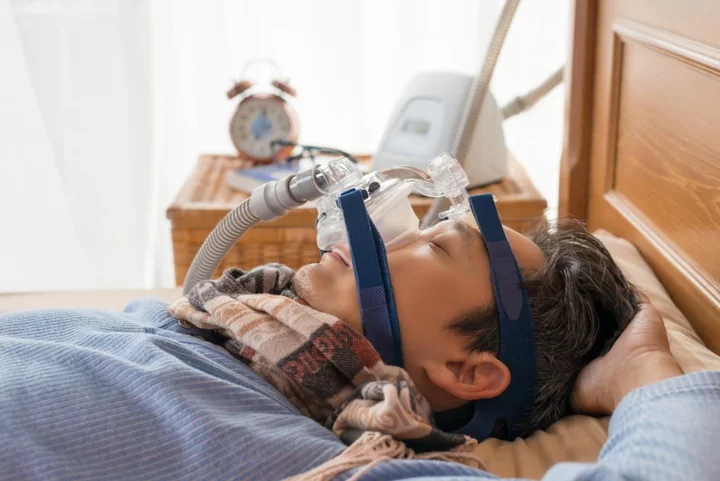
One in five people may be suffering from ‘dangerous’ sleep disorder
About one in five people may be suffering with obstructive sleep apnoea (OSA), a condition that often makes individuals snore loudly, according to a new study. People with the condition often wake up several times in the middle of the night as their breathing starts and stops during sleep. Researchers said OSA can cause people to feel tired and may also increase their risk of high blood pressure, stroke, heart disease and type 2 diabetes. While some treatments and lifestyle changes have been proven to help people with the condition, the new study published recently in the journal ERJ Open Research, suggested that only a small proportion of people with OSA have been diagnosed and are receiving help. In the study, scientists, including those from the University of Paris-Cité in France, assessed data on over 20,100 French adults. They assessed how many of the participants had been diagnosed with the condition and analysed how many of them may have undiagnosed OSA, using a questionnaire. They then used the data to calculate the proportion of the French population likely to be affected by OSA. The study found about one in five, or just over 20 per cent of the participants, were highly likely to have the condition. Scientists, however, said only 3.5 per cent of the participants were being treated for the condition. OSA was found to be more common in men and among people who were older, had cardiovascular disease, lower socioeconomic status or were less physically active. The condition was also more prevalent among smokers and in people with symptoms of depression. Women are also at a higher risk of going undiagnosed with OSA, said scientists. “We know that OSA is a major health hazard but if patients are diagnosed with the condition, they can be given treatments and advice to mitigate the risks,” study lead author Pauline Balagny said in a statement. “Our study suggests that OSA is common, but the majority of those affected do not know they have the condition. Our findings are in line with research in other countries which suggest that OSA is becoming more common,” Dr Balagny said. Citing one of the limitations of the study, scientists said the analysis relied on a questionnaire to gauge the likelihood of OSA instead of testing participants in a sleep clinic. However, the strength of the research lies in assessing data from a large group of people representative of the French population, they said. The findings highlighted that many people with OSA are not aware that their snoring and sleepiness are signs of deeper problems. “We need to raise awareness of OSA because once people are diagnosed, they can be given treatment and advice to help lower their risk of other serious conditions such as stroke, heart disease and diabetes,” said Winfried Randerath, a sleep disorder expert from the European Respiratory Society, who was not involved in the study. “Although OSA is more common in men, this study indicates that we also need to get better at spotting the condition in women,” Dr Randerath said. Read More Study reveals why it may not be a good idea to take lengthy naps New blood test could bring in law for minimum hours sleep needed to drive Lack of evidence on antidepressants for chronic pain, say experts Mother shares horrifying moment she found ticks living in her daughter’s ear Hilary Duff admits she ‘sometimes’ follows Gwyneth Paltrow’s controversial diet Ice-T reveals his and Coco Austin’s 7-year-old daughter still sleeps in their bed
1970-01-01 08:00

Hilary Duff admits she ‘sometimes’ follows Gwyneth Paltrow’s controversial morning coffee diet
Hilary Duff has revealed that she often follows Gwyneth Paltrow’s controversial coffee-only diet in the morning. The 35-year-old actor recently appeared on the Lipstick on the Rim podcast, where she spoke about her beauty secrets and makeup regimen. While sharing details about her daily routine, the Lizzie McGuire star admitted that she tends to follow Goop founder’s morning ritual. “I wake up really hungry,” Duff told podcast host Molly Sims on Tuesday 9 May. “Sometimes I try to – you know, Gwyneth’s in trouble for saying this – but sometimes I try to just drink coffee in the morning and starve off my hunger.” The 50-year-old lifestyle guru recently turned heads when she detailed her wellness routine, which included drinking coffee or “celery juice with lemon or lemon water” in the mornings so that she won’t “spike [her] blood sugar”. Paltrow recently sparked backlash when she described her daily eating habits during a March episode of The Art of Being Well with Dr Will Cole podcast. The Oscar winner began by explaining that she usually eats dinner “early in the evening” so that she’s “really done eating by 7pm.” “And then I do a nice intermittent fast until I usually eat something at about 12pm,” Paltrow continued. Then, she tends to have coffee, or “celery juice with lemon or lemon water” in the mornings, as she doesn’t want something that will “spike [her] blood sugar” before exercising with one hour of pilates or walking. Her afternoon meals consist of “bone broth for lunch a lot of the days,” while she eats “according to paleo” for dinner. Paltrow’s daily routine sparked considerable criticism, as many dieticians claimed it resembled disordered eating habits. The Iron Man star later clarified her podcast remarks, noting that she has been working with her doctor. @dearmedia #gwynethpaltrow shares her daily wellness routine on The Art Of Being Well, listen now ? #wellnessroutine #healthandwellness #healthylifestyle #routines #goop #podcastclips ♬ Aesthetic - Tollan Kim “This is a person I’ve been working with for over two years now to deal with some chronic stuff,” Paltrow explained in a post on her Instagram Story, adding that she’s been experiencing post-Covid symptoms. “The way it manifests for me is very high levels of inflammation over time, so I’ve been working with Dr Cole to really focus on foods that aren’t inflammatory.” “This was a transparent conversation with me and my doctor,” she said. “It’s not meant to be advice for anyone else. It really just works for me, and it’s been very powerful and very positive.” Paltrow also informed critics that the foods she mentioned on the podcast are not what she eats every day, adding: “And by the way, I eat far more than bone broth and vegetables. I eat full meals, and I also have a lot of days of eating whatever I want. And eating, you know, French fries and whatever.” Despite sometimes following Paltrow’s morning routine, Duff admitted on the Lipstick on the Rim podcast that she still eats “lots of calories” when packing school lunch for her three children. The former child star shares daughters Banks, four, and Mae, two with husband Matthew Koma. She also shares 11-year-old son Luca with ex-husband Mike Comrie. “If we’re being honest, yeah, I eat a chicken nugget in the morning while I’m packing lunches and there’s one left over,” she confessed. “Pop it down the hatch!” In addition to the occasional chicken nugget, some of the How I Met Your Father star’s favourite foods included “cauliflower rounds” in the air fryer, topped with an avocado, fried egg, or vegan sausage. As for her fitness routine, Duff shared that she works out with a trainer and focuses on high-intensity interval training (HIIT) workouts. Read More Dietitians attack Gwyneth Paltrow’s wellness diet: ’Not enough food’ Gwyneth Paltrow responds to backlash over viral wellness routine and diet: ‘I eat full meals’ Fans defend Hilary Duff after news outlet says she’s ‘still looking great’: ‘Is 35 supposed to be old?’ Mother shares horrifying moment she found ticks living in her daughter’s ear Ice-T reveals his and Coco Austin’s 7-year-old daughter still sleeps in their bed ‘Queen of the mommy bloggers’ Heather Armstrong dies aged 47
1970-01-01 08:00

Ice-T reveals his and Coco Austin’s 7-year-old daughter still sleeps in their bed
Ice-T has revealed that his seven-year-old daughter, who he shares with wife Coco Austin, still sleeps in the same bed as her parents. On Tuesday’s episode ofThat Moment with Daymond John podcast, the 65-year-old opened up about his relationship with his child, Chanel, while making the revelation about her sleeping habits. “I was there when Coco was pregnant, I went to the hospital and Chanel still sleeps in the bed with,” Ice-T, whose real name is Tracy Lauren Marrow, said. “So I’m so much more connected to her than my other kids. But it’s been a beautiful thing.” He also spoke candidly about his two older children, Letesha, 47, and Tracy Jr, 31, whom he welcomed with previous partners. He explained how he’s more present in Chanel’s life than he was in Letesha’s since he was so young when he first became a parent. “I think the difference with Chanel and my other kids is I’m very conscious of this baby,” he said. “I had my daughter when I was in high school, I was ripping and running. So it was presents over presence. I wasn’t there.” The musician confessed that when he welcomed his son, he was extremely focused on his career. “My son Ice happened right when I was becoming Ice-T, I’d never been famous before, this was a whole new thing, so I’m distracted by that,” he said. “Chanel, I’m comfortable, I’m in a cruise pattern.” The hip hop artist also acknowledged how welcoming Chanel changed his perspective on everyday life and made him “want to live forever”. “It made me create new goals. ‘Cause you got bread, you could start slowing down. But nah, not that new baby,” he said. “It’s the best gift I could ever get.” His comments come two months after he talked about becoming a parent for the third time during an interview with E! News in March. Ice-T explained how he’s been encouraged to stay healthy because of Chanel. “When Chanel was born, all of a sudden I got more healthy, I’m in shape. Because you can start to slow down—I can’t start to slow down,” he said. “I’ve got grown kids. Now I’ve got a new daughter and I’m so focused with her. It’s just amazing. It’s a great thing. And you’ve gotta have a reason for living, you’ve gotta have motivation. Chanel is my new motivation.” Ice-T’s parenting comments come months after his wife was hit with online backlash over her parenting habits. In September 2022, fans criticised a video on Austin’s Instagram in which Chanel took a bath in a sink. At the time, Austin took to Twitter to address the criticism, writing: “Wow just Wow! Here we go again! Giving my lil girl a bath in the sink went Viral? SMH! People,you gotta know by now that I’m an unconventional mother. I do what works and is easier on me. Some may want to take some pointers rather than rag on me!” Ice-T isn’t the first celebrity to open up about his children’s sleeping habits. In July 2022, Clueless star Alicia Silverstone revealed that her 11–year-old son, Bear, still sleeps in her bed. That same month, Kristen Bell said that her and Dax Shepard’s children had “graduated” and started sleeping in their own rooms, after previously sharing a bedroom with their parents. Read More Billie Eilish reveals she slept in same bed as brother and parents until she was 11 due to separation anxiety Actress Alicia Silverstone reveals she still sleeps in same bed as her 11-year-old son Kristen Bell says she no longer shares bedroom with her two children: ‘They now sleep in their room’ Mother shares horrifying moment she found ticks living in her daughter’s ear Apple Martin hilariously reacts to Gwyneth Paltrow’s candid dating confessions Heidi Klum faces backlash for lingerie photoshoot with 18-year-old daughter Leni
1970-01-01 08:00
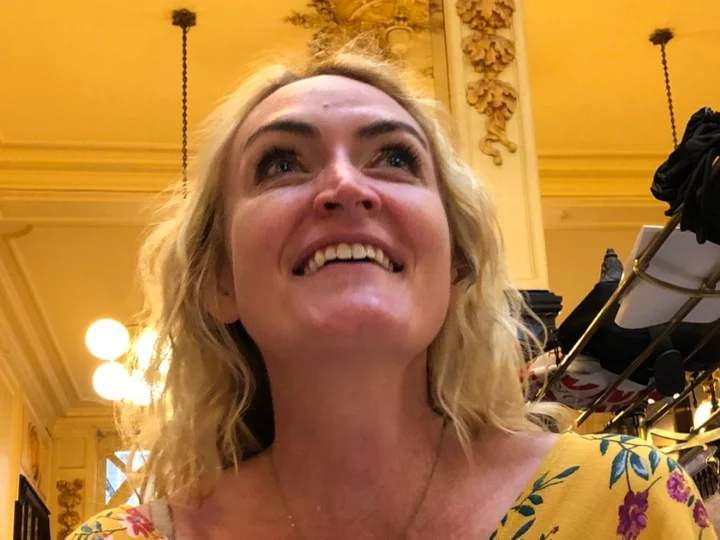
‘Queen of the mommy bloggers’ Heather Armstrong dies aged 47 after detailing battle with depression
Heather Armstrong – an influencer and original “mommy blogger” known by the name “Dooce” – has died aged 47, her social media confirmed. A post on her Instagram account appeared to confirm her passing on 9 May. “Heather Brooke Hamilton aka Heather B Armstrong aka dooce aka love of my life. July 19, 1975 - May 9, 2023,” the caption read. “‘It takes an ocean not to break.’ Hold your loved ones close and love everyone else.” No further details on her cause of death have been revealed. Armstrong, who lived in Salt Lake City, Utah, rose to internet fame in the early 2000s with her popular blog, Dooce.com. The mother of two, often hailed as the “queen of the mommy bloggers” wrote candidly about parenthood, her struggles with sobriety and depression, and why she left the Church of Jesus Christ of Latter-Day Saints, according to Vox. She was named one of Forbes’ top 30 most influential women in media in 2009, and went on to author many books, including Things I Learned About My Dad: In Therapy,It Sucked Then I Cried, and The Valedictorian of Death. More follows… Read More Mother shares horrifying moment she found ticks living in her daughter’s ear Jennifer Garner recalls her shocked reaction after learning about vaginal collapse Jennifer Lopez ‘understands’ why her 15-year-old twins ‘don’t want to talk’ to her
1970-01-01 08:00
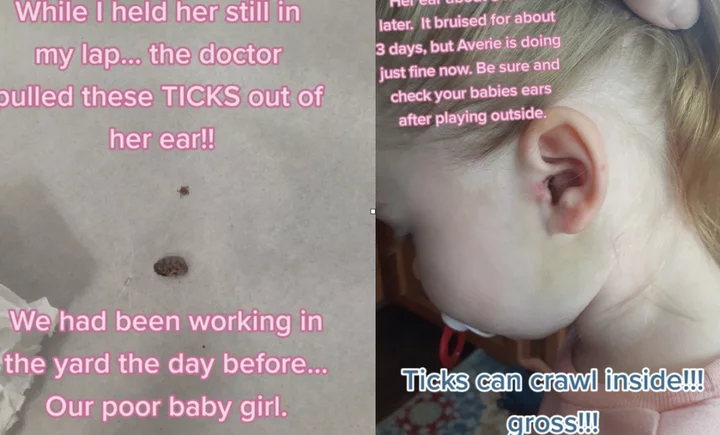
Mother shares horrifying moment she found ticks living in her daughter’s ear
A mother has spoken out about the horrifying moment that she discovered ticks inside her daughter’s ear. The parent, Jessic Loach, took to TikTok this week to share a photo montage about the experience. Loach’s video started off with a picture of her daughter’s ear, which appeared to have a black mark inside it. “I went to wash my daughter’s ears during bath time, and it looked like she had shoved something in her ear,” she wrote in the text over the photo. She went on to share another photo of her daughter, Averie, itching her ear and explained what she did next. “Immediately called her doctor and they said bring her in ASAP,” she wrote. Loach also included a photo of her child at the doctor’s office, sharing that her daughter “acted fine, except for when someone messed with or wanted to look in her ear”. She went on to share another photo of her daughter’s ear, which was red on the inside and appeared to have a scab in it. She addressed her fears over the situation, adding: “I had no idea what to expect and was so scared for our baby girl.” Loach then posted a picture of one of the ticks that the doctor “pulled” out of her daughter’s ear. She noted how the tick could have gotten in there, adding: “We had been working in the yard the day before…Our poor baby girl.” She concluded her photo montage with one last picture of Averie’s ear as it was healing. She said the child was doing better before urging fellow parents to be on the look out for ticks. “Her ear about five hours later,” she wrote in the text over the photo. “It bruised for about three days, but Averie is doing just fine now. Be sure and check your babies’ ears after playing outside. Ticks can crawl inside!!! Gross!!!” After Loach’s video quickly went viral, with more than 2.1m views so far, the mother spoke to People about the experience. “The removal process was very traumatising as you have to hold the child still to remove items safely,” she explains. “A two-year-old just doesn’t understand what the doctor is trying to do.” She added: “I had no idea it was a tick until the doctor started removing it from her ear.” The mother also said Averie has fully recovered one month after the incident occured. “I’m just glad she didn’t have any after effects,” she said. Since posting the video, Loach said that many parents told her about their experiences where ticks crawled onto their children. “I’ve learned it happens more than I could have ever imagined,” she added. According to the National Institutes of Health (NIH), it’s important to properly remove a tick when found on one’s body. “There is a lot of folklore about how to take a tick out of your skin. Some people even talk about having a lighted cigarette close by, things like that,” said José Ribeiro, who is the chief of the Vector Biology Section of the Laboratory of Malaria and Vector Research in NIAID’s Division of Intramural Research. “The most important thing is just to use appropriate forceps such as tweezers. Grab the whole tick and pull it out.” The publication also noted that the best way to prevent ticks is by wearing clothes that cover ones’ arms and legs, when outside. People could also opt to tuck their pants into their socks to ensure that their bodies are completely covered, especially when in the woods or on a hiking trail. It’s also best to remove the tick as quickly as possible, as it takes about 36 hours for Lyme disease to be transmitted from a tick. Per NIH, this bacterial infection, which people can get from “the bite of an infection tick,” usually starts with symptoms like a rash, fever, or headache. If not treated early, the infection can impact a person’s heart and nervous system. The Independent has contacted Loach for comment. Read More A woman secretly recorded her husband at home. Now she’s divorcing him Watch: Mother ‘can barely move her hands’ after years of gel nails Mother claims using a miraculous eye cream has taken years off her in just weeks How has Camilla’s style evolved since she became Queen Consort? A woman secretly filmed her husband at home. Then she left him Mother shows off her glowing skin after using miraculous eye cream
1970-01-01 08:00
